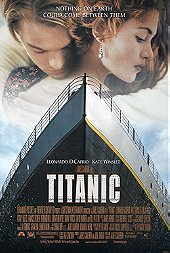Titanic
// James Cameron pitched his idea of 'Romeo & Juliet on the Titanic' to 20th Century Fox, who were unsure of its commercial prospects but wanted a long partnership with him, they greenlit the project with an unprecedented $200m budget. Titanic was released in 1997 to become the highest-grossing film of all-time, earning two billion dollars. 20th Century Fox were very happy indeed to have taken the risk, but I'll bet they were as worried as everyone else that it was going to sink.
As the story goes, Jack (Leonardo DiCaprio) a poor young man who wins himself a ticket home on the maiden voyage of the world's most famous - and soon to be infamous - ocean liner. Rose (Kate Winslet) a rich girl internally dying amid the rigid control and duty of post-Edwardian society, forcibly and miserably engaged to beastly aristocrat Cal Hockley, the saviour to her family's debts. In a fit of sudden terror, she considers throwing herself into the ocean off the back of the ship, but heroic Jack saves her from a (pre-emptive) fate worse than death (cosseted social strictures) as he believes she wouldn't have jumped; his directness, optimism and artistry are to capture Rose's heart, but the only obstacle that tears them apart is the watery grave most of the passengers perish in. Old Rose recounts the events of 1912 with detail, frankness and surprising clarity in comparison to her fading short-term, but as she states, the only place Jack exists is in her memory, and by the end of the film, they are reunited upon her fulfilling his pre-death promise that she will last until old age after a happy, varied life, dying peacefully in her bed, however, not before physically (and metaphysically) returning the heart of the ocean necklace (as well as that of her own to Jack and the Titanic) to its rightful place, thus being reunited with her true love. Essentially, Titanic explores social position, class division and the stoicism and nobility of a bygone era, presenting us with the nature of human survival - its purest form is raw and instinctive during the sinking - the majority of the ship's officers and their critically bad actions and shoddy handling of the disaster. Perhaps the most shocking idea is the folly and laughable disbelief that any ship could ever possibly be unsinkable, and why was nobody educated in the dangers of travelling on ocean liners? Even more so, why weren't tests carried out of the possibilities such as iceberg collision compared with that of the poorly built engineering? Outdated safety features and tests were carried out during its production, and maritime regulations were not up to standard, lacking enough lifeboats to accommodate even half its passengers. Perhaps it could be said that the disaster was very much guaranteed. Titanic teaches the viewer that life is uncertain, the future unknowable and the unthinkable possible; no doubt the passengers were led to their deaths in the misguided belief the ship they were travelling upon was unsinkable, it is infamous for that press label alone and the deaths of 1, 514 people.
For any film fan, it is an undeniable spectacle of epic grandeur, action and romance. Despite its popularity, many people defy its power and refuse to acknowledge its brilliance. However, for three hours of cinematic splendour and pure entertainment, its a masterpiece. Try to derail it and you will come across as those cynical fools who bashed every James Cameron film for its lack of subtlety, but if you don't like it, that's your opinion. After all, who remembers the crowds of people, queues and revellers outside the cinema in 1997? Two-billion dollars worth make this the planet's favourite film, that's a fact.
 Login
Login